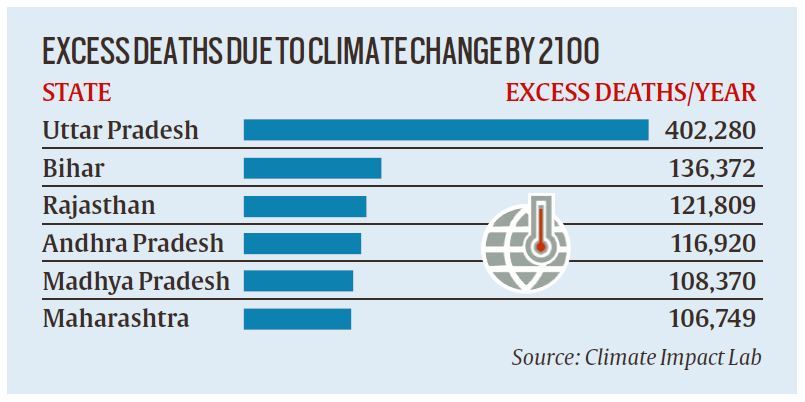Study “Climate Change and Heat-Induced Mortality in India” 08/11/2019 – Posted in: Daily News – Tags: Climate Impact Lab, Tata Centre for Development (TCD) at the University of Chicago
Study “Climate Change and Heat-Induced Mortality in India”
For: Mains
Topics covered:
- Key findings of the study ‘Climate Change and Heat-Induced Mortality in India’
- About Climate Impact Lab
- About Tata Centre for Development at the University of Chicago.
News Flash
The study, ‘Climate Change and Heat-Induced Mortality in India’, was conducted by the Climate Impact Lab in collaboration with the Tata Centre for Development at the University of Chicago.
Major findings
- A new study has projected that 1.5 million more Indians may die per year from extreme heat due to climate change by 2100.
- India’s energy use will more than double in the next 20 years, driven largely by fossil fuels.
- If emissions continue to be as high as they are at present, India will see a death rate of about 60 per 100,000 by 2100.
- This projected death rate is double the current death rate from oral cancer in India, which is the most common cancer in the country.
- The average annual temperature in India is expected to increase from 24°C to 28°C.
- The number of extremely hot days (above 35°C) across India is expected to increase by over eight times in 2100.
- The National Capital Region is projected to see 22 times more extremely hot days and more than 23,000 climate-related deaths annually by 2100 in a high-emission scenario.
- Odisha is projected to see the highest increase in the number of extremely hot days, at about 30 times more than what it is today.
- Punjab is projected to experience 85 extremely hot days a year, the highest among all states.
- Overall, the six states of Uttar Pradesh, Bihar, Rajasthan, Andhra Pradesh, Madhya Pradesh and Maharashtra are projected to account for over 64 percent of the heat-related deaths.
- The projected death rate in a high-emission scenario is 60 per 100,000 by 2100. Mitigation of emissions will bring down the death rate to roughly about 10 per 100,000
- The risks associated with extreme temperatures vary around the world and are dependent upon the wealth of a country.

Study – Climate Change and Heat-Induced Mortality in India
Climate Impact Lab
The Climate Impact Lab is a unique collaboration of more than 30 climate scientists, economists, computational experts, researchers, analysts, and students from some of the nation’s leading research institutions.
Tata Centre for Development (TCD) at the University of Chicago
TCD at the University of Chicago works to identify novel solutions to India’s most pressing development challenges and to ensure that these ideas are translated into outcomes that improve people’s lives. It was launched in 2016 with generous support from the Tata Trusts.
Source: Indian Express
READ MORE DAILY NEWS
- ‘India Internet 2019’ Report
- South Asia Co-operative Environment Programme (SACEP)
- Alternative Investment Fund
- Indian Air quality Interactive Repository (IndAIR)
- Vaccine Hesitancy
- Danakil Depression
- Harmonized System (HS) code
- Online shopping as an addictive disorder
You are on the Best Online IAS preparation platform. You are learning under experts.
We are present on Facebook- Diligent IAS, LinkedIn- Diligent IAS, YouTube- Diligent IAS, Instagram- Diligent IAS. Get in touch with us.
